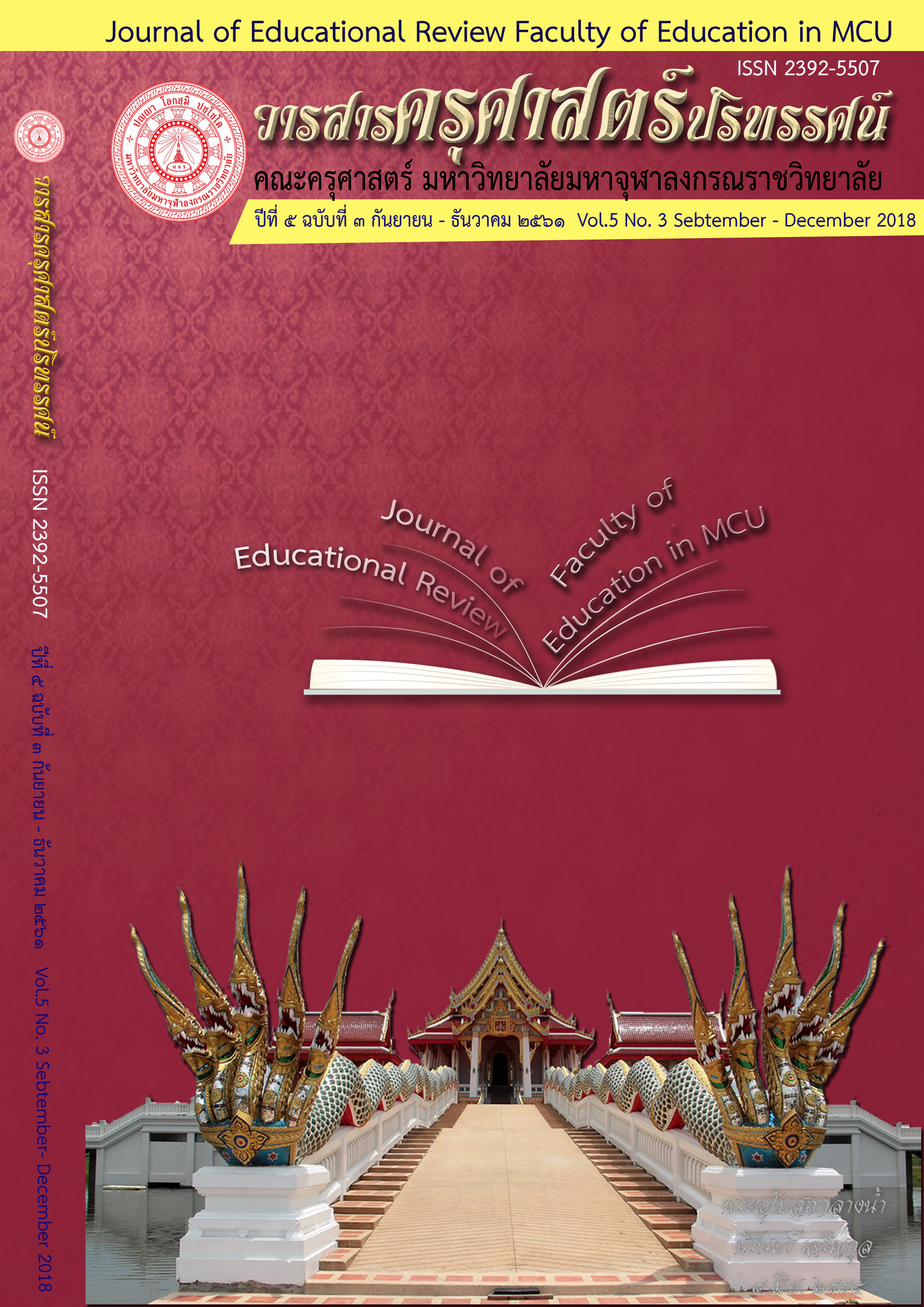Guideline on Leadership Development Based on Kalyanamittadhamma for School Administrators of Pom Nagaraj Sawathayanon School Under the Secondary Educational Service Area Office 6
Main Article Content
Abstract
The objectives of this research were; 1. To study a guideline on leadership
development based on Kalyanamittadhamma for school administrators of Pom
Nagaraj Sawathaynon School under the Secondary Educational Service Area Office 6,
2. Study the use of Kalyanamittadhamma of school administrators of Pom Nagaraj
Sawathaynon School under the Secondary Educational Service Area Office 6, and 3.
To propose a guideline on leadership development based on Kalyanamittadhamma
for school administrators of Pom Nagaraj Sawathaynon School under the Secondary
Educational Service Area Office 6. The mixed research methodology was used in the
study. The qualitative data were collected by interviews with 7 school teachers and
administrators while the quantitative data were obtained from 77 school teachers
and administrators through questionnaires. The questionnaires were tried out with
teachers and administrators with IOC value at 1.00 and confidence value at 0.829.
The data were analyzed by percentage, mean and standard deviation.
The results of the study showed that:
1. The opinion of teachers and administrators towards the use of Kalyanamittadhamma of
school administrators of Pom Nagaraj Sawathaynon School under the Secondary
Educational Service Area Office 6 was at the high level overall. In aspect, the highest
level was on Never exhorting groundlessly, followed by Loveable, Being a counselor,
and Adorable respectively.
2. The guidelines on leadership development based on Kalyanamittadhamma
are as follows; 1) Loveable; to have a good habit, a good character, neat and tidy
clothes, kind and friendly, and hospitality 2) Respectable; to have suitable behaving,patient in situations, and moral and ethics 3) Adorable; to have the real knowledge
and skills in work, democratic idea and modern up-date knowledge 4) Being a
counselor; knowing how to express idea, approach others, assign the work, and plan
to improve the work 5) Being a patient listener; being ready to listen to different
ideas, patient to situations, and to build administrative network and teamwork 6)
Able to treat profound subjects; to have ability in clarify the profound subjects to
others, vision in administration, and public relations 7) Never exhorting groundlessly;
to remain on morality and ethics
Article Details
ทัศนะและความคิดเห็นที่ปรากฏในบทความในวารสารฉบับนี้ถือเป็นความรับผิดชอบของผู้เขียนบทความนั้นเพียงผู้เดียว และไม่ถือเป็นทัศนะและความรับผิดชอบของกองบรรณาธิการ
กองบรรณาธิการขอสงวนสิทธิ์ในการคัดเลือกบทความลงตีพิมพ์และจะแจ้งให้เจ้าของบทความทราบหลังจากผู้ประเมินบทความตรวจอ่านบทความแล้ว
ต้นฉบับที่ได้รับการตีพิมพ์ในวารสารครุศาสตร์ปริทรรศน์ คณะครุศาสตร์ มหาวิทยาลัยมหาจุฬาลงกรณราชวิทยาลัย ถือเป็นกรรมสิทธิ์ของคณะครุศาสตร์ มหาวิทยาลัยมหาจุฬาลงกรณราชวิทยาลัย ห้ามนำข้อความทั้งหมดหรือบางส่วนไปพิมพ์ซ้ำ เว้นเสียแต่ว่าจะได้รับอนุญาตจากมหาวิทยาลัยฯ เป็นลายลักษณ์อักษร
References
พริ้นติ้งแมสโปดักส์จากัด, ๒๕๕๑.
พระพรหมคุณาภรณ์ (ป. อ. ปยุตฺโต). (๒๕๔๐). เพื่อชุมชนแห่งการศึกษาและบรรยากาศแห่ง
วิชาการ. พิมพ์ครั้งที่ ๕. กรุงเทพมหานคร: โรงพิมพ์สหธรรมมิก, ๒๕๔๐.
________. (๒๕๕๑). พจนานุกรมพุทธศาสตร์ ฉบับประมวลธรรม. พิมพ์ครั้งที่ ๑๘.
กรุงเทพมหานคร: บริษัท สหธรรมิก, ๒๕๕๑
________. (ป. อ. ปยุตฺโต). (๒๕๕๒). พุทธธรรม ฉบับขยาย ความ, พิมพ์ครั้งที่ ๒๐.
กรุงเทพมหานคร : สหธรรมมิก, ๒๕๕๒.
ภาวิดา ธาราศรีสุทธิ. (๒๕๔๓). ภาวะผู้นาสาหรับผู้บริหารการศึกษา. กรุงเทพมหานคร: สานักพิมพ์
มหาวิทยาลัยรามคาแหง, ๒๕๔๓.
มหาวิทยาลัยมหาจุฬาลงกรณราชวิทยาลัย. (๒๕๓๙). พระไตรปิฎกภาษาไทย ฉบับมหาจุฬาลงกรณราช
วิทยาลัย. กรุงเทพมหานคร: โรงพิมพ์มหาจุฬาลงกรณราชวิทยาลัย, ๒๕๓๙.


